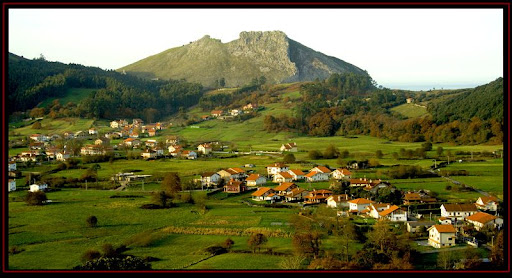From the Basque word for nook, or small space, a txoko is a closed gastronomical society typical across the Basque country. A group of friends will chip in money to buy a commercial space, outfit it with a full kitchen and eating space, (and nowadays a soundsystem and TV and all the comforts of home). The members then use the space to get together and cook and eat together, or with their guests. Traditionally, txokos were about serious culinary creation and experimentation ( and maybe a singsong after dinner), and were for men only. Nowadays, though the focus is still food, in all but the most traditional txokos anything goes, and women are allowed.
And a good thing, because half of the people at Xabi's txoko in Bermeo on Saturday were women. And we didn't really cook: we picked up some roasted chickens and some wine, and threw together a salad, and made some homemade french fries. And we didn't sing any traditional Basque songs, though we did watch the regattas. The txoko had an amazing view of the port of Bermeo and the open ocean, and we could see the news helicopters circling overhead covering the rowing races, we couldn't see the actual boats themselves for the high waves and rain. So we turned on the TV to watch the rowers up close. Urdaibai, the local team, didn't win. But later, as we were having coffee and ice cream in the centre of town later, the team came jogging along the port, and they were given a full cheering, flag-waving, song singing welcome anyway.
 There were a couple of reasons I was looking forward to visiting London. Similar to visiting New York for the first time, I felt this great sense of anticipation, of finally getting to visit another of the world's great metropolises (metropoli?)--cities you know so much about before even setting foot within their limits. I was also looking forward to catching up with Jacqueline, an old friend from Montreal now based in London ( and who welcomed me into her East London pad.) Oh, and there were those meetings with my professors at the University of London.
There were a couple of reasons I was looking forward to visiting London. Similar to visiting New York for the first time, I felt this great sense of anticipation, of finally getting to visit another of the world's great metropolises (metropoli?)--cities you know so much about before even setting foot within their limits. I was also looking forward to catching up with Jacqueline, an old friend from Montreal now based in London ( and who welcomed me into her East London pad.) Oh, and there were those meetings with my professors at the University of London.

 Speakers' Corner, Hyde Park
Speakers' Corner, Hyde Park


















